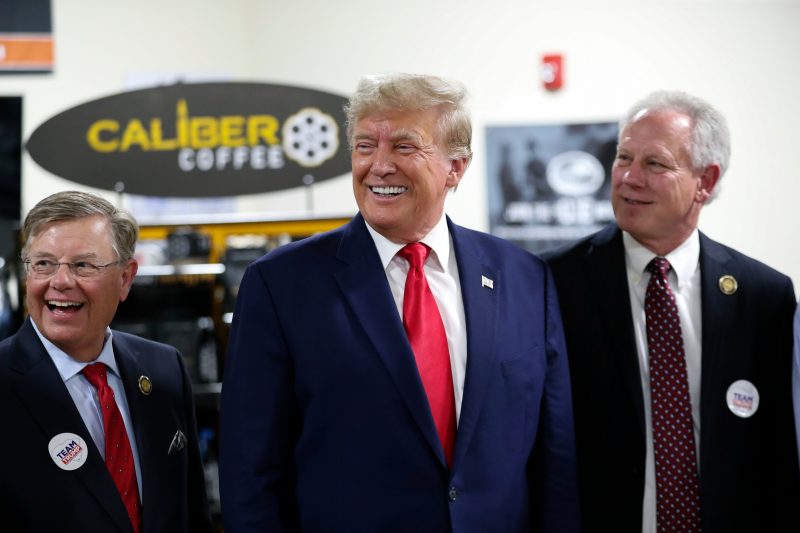One of the patterns to Donald Trump’s bid for the 2024 Republican presidential nomination has been to promise to spend money without doing so. It was an undercurrent to his 2016 bid as well, really, with repeated pledges to spend an enormous part of his own fortune that manifested much more modestly. But this time around, the promises are more concrete, pledges to fellow customers that he would buy McDonald’s hamburgers or Cuban pastries that went unfulfilled. So be it.
On Monday, though, news that Trump was making a purchase — and eventually didn’t — resulted in an entirely different controversy.
In South Carolina before a rally in support of his campaign, Trump stopped at a local gun store. He worked the room, speaking with staff and checking out the available firearms. At one point he posed for a photo with a handgun bearing his likeness.
President Trump doing a little shopping in South Carolina!
He will protect our great Second Amendment!! pic.twitter.com/Qs6Imc8LEb
— Marjorie Taylor Greene (@mtgreenee) September 25, 2023
A short while later, a campaign staffer posted a video of Trump considering a different gun.
“I’ve got to buy one,” he said in the snippet. “I want to buy one.”
The staffer, spokesman Steven Cheung, shared the video as he announced that Trump had purchased a Glock. But he quickly backtracked from that claim, clarifying that Trump only said he wanted to buy the weapon.
It was an important distinction, given that federal law prohibits Trump from being sold a weapon.
For the past quarter century, most people looking to buy firearms in the United States are subject to background checks conducted by the FBI. The National Instant Criminal Background Check System (NICS) allows gun sellers to quickly (or, relatively quickly) validate that a potential buyer is legally allowed to make such a purchase.
Since 1998, there have been about 2.2 million denials following background checks. Most were because the person seeking to make the purchase had an existing criminal conviction that prevented their owning a gun. About 5 percent of the denials, around 120,000, were because the potential buyer was facing federal indictment — as Trump is.
You’ll notice that about twice as many denials stemmed from the potential buyer being an unlawful user of controlled substances. That prohibition is the one that tripped up President Biden’s son, Hunter, whose purchase of a handgun in 2018 allegedly overlapped with a period in which he was abusing illegal drugs. That he claimed not to be a drug user while purchasing the firearm resulted in federal criminal charges earlier this month.
While about 15 percent of the denials over the past 25 years have been a function of either attempted purchases by those under indictment (as would have been the case for Trump) or illegal drug users (as was allegedly the case for Hunter Biden) obscures the fact that very, very few background checks actually result in denials.
Since the NICS was put in place, the number of background checks each month has increased dramatically. Some of those background checks aren’t a function of new gun purchases; in Kentucky, for example, those with certain permits are subjected to regular checks. But most of the checks are linked to such purchases, and those attempted purchases often surge relative to events in the news.
For example, the presidency of Barack Obama saw a dramatic increase in background checks as fears that new limits on gun ownership drove purchasers to buy firearms while they could. The mass shooting in Newtown, Conn., in late 2012 spurred a new push for controls on gun ownership — and a surge in purchases.
In 2020, there were overlapping triggers for purchases: the coronavirus pandemic, the summer’s racial-justice protests and the aftermath of the presidential election. During the Biden administration, background checks have tapered somewhat.
But notice that there are still millions of background checks each month. In August, for example, the FBI recorded 2.1 million checks — a figure only about 100,000 less than the total number of denied background checks since 1998.
The overwhelming number of background checks conducted since 1998 have not been denied. Only 0.03 percent have been denied because the potential purchaser was under indictment. Only 0.05 percent have been denied due to use of controlled substances.
That the leading candidate for the Republican presidential nomination was inadvertently ensnared in questions about the legality of a gun purchase and that the son of his likely 2024 opponent was charged with a violation related to a similar question is remarkable. It’s not surprising that gun laws would be a part of the 2024 election; it’s just surprising that this is the way in which it manifested.
Trump’s ownership of a gun has been in the news before. While he was president, a former official with the New York Police Department alleged that Trump had been granted one of the city’s hard-to-get permits to carry a firearm because of Trump’s support for police-related organizations. In February 2016, he claimed to carry a firearm with him regularly.
Of course, that was before he was under federal indictment.

